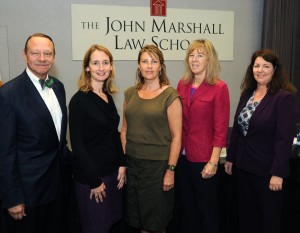
“Why She Doesn’t ‘Just Leave’: Understanding Domestic Violence and Illinois Measures to Empower Survivors,” was moderated by Professor Debra Stark (right). As part of the domestic violence program she developed at John Marshall, Stark invited guests (from left) Circuit Court of Cook County Judge Sebastian T. Patti, presiding judge of the Domestic Violence Division; Margaret Duval, executive director at Domestic Violence Legal Clinic; Gwyn Kaitis, director of the Domestic Violence Help Line; and Kathy Doherty, executive director of Between Friends. The program was co-sponsored by The John Marshall Law School and the Women’s Law Caucus, in recognition of October as Domestic Violence Awareness Month.
Divorce cases involving domestic violence survivors pose unique challenges and a new course at The John Marshall Law School will help prepare students to handle them.
The course, Family Law Advocacy for Survivors of Domestic Violence, will be co-taught in January by Professor Debra Pogrund Stark of John Marshall and Beth McCormack and Bryan Wilson of Kamerlink Stark McCormack & Powers.
The course will focus on the nature and dynamics of domestic violence so that students will understand, first and foremost, the phenomenon of separation assault and the importance of safety planning.
“When you’re working with survivors, if you don’t understand the underlying dynamic of this, you can, in fact, do some harm unintentionally,” Stark said.
Students will learn about the tremendous emotional and psychological harm their clients have experienced so that they can better prepare their clients for difficulties they are likely to encounter in the divorce action. Students also will learn how the motivation of power and control is often at the heart of the abusive partner’s actions, how that is likely to play out during the divorce action and steps attorneys can take to address this.
After learning about the nature of domestic violence, the students will then focus on the Illinois laws relating to several issues – including grounds for dissolution of marriage, spousal support, child custody and procedural matters and ethical obligations – using a simulation model based on a specific case.
The course also will cover orders of protection under the Illinois Domestic Violence Act and touch on other key laws clients can benefit from, such as the Safe Housing Act and the Victim Economic Security and Safety Act.
After taking this very practical, interdisciplinary approach to representing survivors seeking a divorce and related remedies, the students will have an opportunity to put what they have learned to good use in the following semester.
Professor Stark has developed field placement clinical internships with the family law attorneys co-teaching the Family Law Advocacy course with her, as well as with non-profit legal service providers such as the Legal Assistance Foundation, the Chicago Legal Clinic and the Domestic Violence Legal Clinic. Under these internships, students will assist lawyers in representing survivors of domestic violence seeking a divorce and will be able to put into practice what they have learned.
“I think that this is a great opportunity for our students,” Stark said. “The best form of teaching is by having students actually perform the legal work, such as drafting a petition for dissolution or appearing before a judge on a contested motion or prove-up. They key is that this work be done under proper supervision and after an adequate groundwork has been laid.”
The course is a prime example of John Marshall’s focus on experiential learning.
John Marshall leads the nation in the number of credits required in practice-based courses and experiential learning. The experiential learning is a three-credit graduation requirement that will have students meet new expectations for experiential learning through a clinical experience or an externship sometime during their last three semesters of law school.

